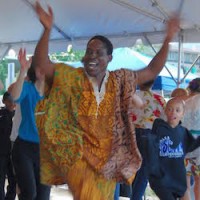Ghana, like other West African nations, has an especially deep cultural heritage.
The arts of dancing, drumming, singing and storytelling have occupied a central place in the daily lives of the people for many generations.
Until recently, these traditional arts have been carefully preserved and passed down, especially through institutions devoted to keeping them alive.
The Academy of African Music and Arts, in the seaside village of Kokrobite, was one such center. Founded in 1988 by Mustapha Tettey Addy, a renowned performer and ethnomusicologist, AAMA fostered the traditional arts among the local people, other Africans and visiting Westerners, who came to enrich their own art with the sound and spirit of West Africa. Stevie Wonder came to learn, so did Rita Marley, Steve Coleman and Isaac Hayes.
Several years ago, due to financial mismanagement, AAMA was forced to close.
Other cultural centers have suffered similar fates.
Today, there are far fewer venues offering instruction in traditional West African performance, and that dearth is felt. Maputo Mensah, a student and teacher at AAMA for fourteen years, and now a teacher of African dance and drumming at the University of Colorado and Naropa University, had a wake-up call on a recent trip home to Kokrobite:
“I was talking to some local kids on the beach, and they said to me, ‘Our parents have told us about seeing you and your brother dance and drum at AAMA. We want to learn to do that too, but there is no place for it here!’ My heart just sank, because I knew they were right, and because I’ve wanted to provide that place myself ever since AAMA closed.”
Maptuo decided he couldn’t wait any longer to begin work on his dream. He and his brother Mawuenyega already owned land in Kokrobite, so he used some funds earmarked for savings to hire an architect and commission a plan.
By the end of July, foundations for the new Akpe Cultural Center has been dug. As the brothers envision it, the center will offer accommodations, master instruction, practice and performance space, and areas to gather in the evening to tell stories in traditional Ghanian style.
The center will offer classes in the traditional arts for everyone from beginners and small children to visiting recording artists, as AAMA did in its day. It will also expand its offerings to include arts of other cultures and contemporary fusion elements.
Maputo feels strongly about the need to preserve and nurture the arts of West Africa:
“When I was growing up in Ghana, dancing, drumming, and singing were how we lived life and shared it with others. Our days were filled with rhythm and music. We celebrated our joys, honored and remembered our ancestors, and comforted ourselves when we were sad or hungry. Our family sometimes had no food, but we could always dance to fill our souls. I want today’s children and future generations to have that experience as well. I also want to help provide jobs for Kokrobite, because while you can dance on an empty stomach, it’s much easier if you don’t have to!”
He also has thoughts on what West African traditions have to offer the world at large. He says, with conviction, “No digital device can heal and restore our bodies and spirits, but these arts can. Now, more than ever, the world needs to learn them.”
For more information about Maputo Mensah and the Akpe Cultural Center, go to maputomensah.com.
Love elephant and want to go steady?
Sign up for our (curated) daily and weekly newsletters!
Author: Maputo Mensah
Editor: Emily Bartran
Photo: Author’s Own












Read 0 comments and reply